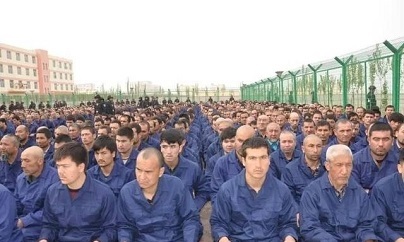You are using an out of date browser. It may not display this or other websites correctly.
You should upgrade or use an alternative browser.
You should upgrade or use an alternative browser.
CHINA out here calling out BS from the international community.
- Thread starter RedCloakBlackWraithe
- Start date
More options
Who Replied?AyBrehHam Linkin
First Black Brehsident
Right message wrong messenger.
more messengers sending the same message is a good thing.Right message wrong messenger.
00:00:00 - 00:25:00
In this YouTube video titled "China Counters US Point by Point At ICJ | Israel’s Occupation Of Palestine | Dawn News English," China advocates for the importance of a two-state solution in the Palestinian question and argues for the legitimacy of the Palestinian people's right to self-determination through international law. China asserts that the International Court of Justice (ICJ) has jurisdiction to issue an advisory opinion without disrupting negotiations or encroaching upon consent. The Chinese representative also emphasizes the illegality of Israel's occupation of Palestinian territory based on the principles of non-use of force and the prohibition of acquiring territory by force. The speaker highlights the use of force and self-determination within international law, specifically in relation to the Palestinian people and the occupation. China calls for mutual efforts from both parties and the international community to find a peaceful resolution, encouraging respect for each other's concerns and a harmonious coexistence between two states.See less
- 00:00:00 In this section of the YouTube video titled "China Counters US Point by Point At ICJ | Israel’s Occupation Of Palestine | Dawn News English," China makes its case before the International Court of Justice (ICJ) for jurisdiction and the importance of a two-state solution to the Palestinian question. China argues that the court has jurisdiction to render an advisory opinion and that it would not circumvent the principle of consent or disrupt negotiations. The erosion of the foundation for a two-state solution and the lack of progress toward restoring Palestinian rights were highlighted, emphasizing China's support for a comprehensive ceasefire and an early solution based on this basis. Additionally, China's written statement covers the topics of self-determination, the use of force, and international humanitarian law.
- 00:05:00 In this section of the video, China emphasizes its support for the International Court of Justice (ICJ) in settling the Palestine question according to international law. China believes the advisory opinion will not create new rules but will be based on established legal frameworks, including Security Council resolutions and the Universal Declaration of Human Rights. The legal guidance offered will facilitate peace negotiations. Transitioning to the Palestinian people's right to self-determination, the Chinese representative explains that the Palestinian-Israeli conflict arises from Israel's prolonged occupation and oppression of the Palestinian people. Self-determination is a fundamental principle in international law, enshrined in the UN Charter. China clarifies that self-determination applies to colonized or occupied peoples and does not provide grounds for secession. The right to self-determination for the Palestinian people has been consistently reaffirmed in multiple UN resolutions and is widely recognized by most States and international organizations. The Palestinian people, as a whole, have the right to self-determination, which encompasses preserving their territorial integrity and other related aspects.
- 00:10:00 In this section of the YouTube video titled "China Counters US Point By Point At ICJ | Israel’s Occupation Of Palestine | Dawn News English," the speaker argues for the legitimacy of the Palestinian people's right to self-determination and their use of force to resist foreign oppression. According to the speaker, this right is enshrined in international law and can be seen in the practices of various peoples who have freed themselves from colonial rule and foreign occupation to establish independent states. The Palestinian people's declaration of the establishment of the state of Palestine in 1988 is mentioned as an example, and the use of armed struggle is acknowledged as a legitimate means to realize this right, provided it is within the context of colonial domination or foreign occupation. The speaker cites various international resolutions and conventions, such as the Arab League Resolution 3070 of 1973 and the Organization of African Unity Convention on the Prevention and Combat of Terrorism of 1999, to support this argument. The speaker emphasizes that the use of force in the name of self-determination outside of this context is not considered legitimate.
- 00:15:00 In this section of the YouTube video titled "China Counters US Point By Point At ICJ | Israel’s Occupation Of Palestine | Dawn News English," China emphasizes the illegality of Israel's occupation of Palestinian territory based on international law. According to China, the principle of non-use of force is the core of international humanitarian law (IHL), and the prohibition on acquiring territory by force is a firmly established principle in customary international law. Israel's use of force to occupy and maintain the occupation is seen as illegal, confirmed by several UN resolutions. The two exceptions to the principle of non-use of force, as outlined in the UN Charter, are the use of force authorized by the Security Council under Chapter 7 and the right of self-defense. China argues that an occupying power cannot invoke the right of self-defense if the occupation is unlawful.
- 00:20:00 in this section of the video, the legal analyst discusses the principles of occupation under International Humanitarian Law (IHL) and International Human Rights Law. According to the analyst, an occupying power cannot acquire sovereignty over occupied territory or use self-defense against attacks that occur in the occupied territory. However, the occupying power can take necessary forceful measures against individuals or entities and use force against military targets in accordance with international law. The application of IHL in the occupied territory does not depend on the legality of the occupation itself. The armed conflict between people struggling against colonial domination or foreign occupation and exercising their right to self-determination is considered an international armed conflict, making IHL applicable to all parties involved. The analyst also introduces the principles of temporary administration and non-alteration of territorial sovereignty, emphasizing the non-sovereign nature of military occupation. The occupying power is obligated to preserve the state's institutions of the occupied territory and not alter its sovereignty. The analyst emphasizes that relevant Israeli policies and practices have not followed these principles.
- 00:25:00 In this section of the YouTube video titled "China Counters US Point By Point At ICJ | Israel’s Occupation Of Palestine | Dawn News English", China argues that Israel's occupation of Palestine does not permit the acquiring of sovereignty over the territory. According to China, the occupation's temporary and non-sovereign nature means that the rules of acquisitive prescription in international law do not apply. China maintains that despite the passage of 57 years since the occupation began, the unlawful nature of the occupation and the sovereignty over the occupied territories remain unchanged. The settlement of the question of Palestine necessitates mutual efforts from both Israel and Palestine, along with the international community. China encourages both parties to embrace each other's legitimate concerns, negotiate for peaceful settlement, and work toward two states coexisting harmoniously. The statement concludes with China thanking the court for its patience and the registry and all the staff for their kind support.

SumTube AI - AI-Powered YouTube Video Summarizer
Get quick and accurate AI-based summaries of YouTube videos with SumTube AI. Simplify your video exploration!
 sumtube.ai
sumtube.ai
China Counters US Point By Point At ICJ | Israel’s Occupation Of Palestine | Dawn News English
Published on 2/22/2024472830 views
27 minutes, 38 seconds
19969 likes
Short Summary
- The speaker represents China before the Court, expressing China's commitment to promoting the rule of law in international relations and supporting the Court in preserving peace, security, fairness, and justice.
- The speaker addresses the question of Palestine, emphasizing the longstanding suffering of the Palestinian people and the erosion of the two-state solution.
- China calls for a comprehensive ceasefire and an early resolution to the Palestinian question through negotiation.
- The speaker elaborates on China's views in three parts: the advisory jurisdiction of the Court, self-determination of peoples, and international humanitarian law.
- China argues that the Court has jurisdiction over the case and refutes concerns that an advisory opinion would circumvent consent or disrupt negotiations.
- The speaker highlights the Palestinian people's right to self-determination, emphasizing it as a fundamental principle of international law enshrined in the UN Charter.
- The principles of non-use of force and self-defense are discussed within the framework of international law, with specific reference to the UN Charter and customary international law.
- International humanitarian law applies to all parties involved in conflicts where oppressed peoples are fighting against colonial domination or foreign occupation in pursuit of self-determination.
- Occupation is a special regime involving the temporary administration of occupied territory by an occupying power, governed by two principles: temporary administration and non-alteration of territorial sovereignty.
- China emphasizes mutual efforts from Palestine, Israel, and the international community to work towards a peaceful settlement and the coexistence of two states in peace.
Last edited:
against?hasnt china been conducting their own genocide?
Dwayne_Taylor
Superstar
Per Google:against?
Uyghurs, ethnic Kazakhs, and other Muslim minorities are being subjected to forced labor in China following detention in re-education camps.
Those fakkits are killing Muslims themselves 

Roger king
Superstar
Forgive me if i dont take china sincerity to heart or out of morality, they lock dissenters in concentration camps and run the state with an iron fist, google tianamen square for info, xi jinping is a ruthless authoritarian
AyBrehHam Linkin
First Black Brehsident
more messengers sending the same message is a good thing.
the irony is hilarious given China's brutal oppression of Western Muslims in their territories including an open air prison in Xinjiang with almost 18 million more Muslims then Gaza.

Persecution of Uyghurs in China - Wikipedia
Theyre no different then Israel tbh.
Doesn't China send their own Muslim population (Uyghurs) to labor camps? Like another poster said they may be the wrong messenger here 



China is out here intimidating all of Asia and India. Stop it.
You and your people should do something about itChina is out here intimidating all of Asia and India. Stop it.
Similar threads
- Replies
- 56
- Views
- 5K